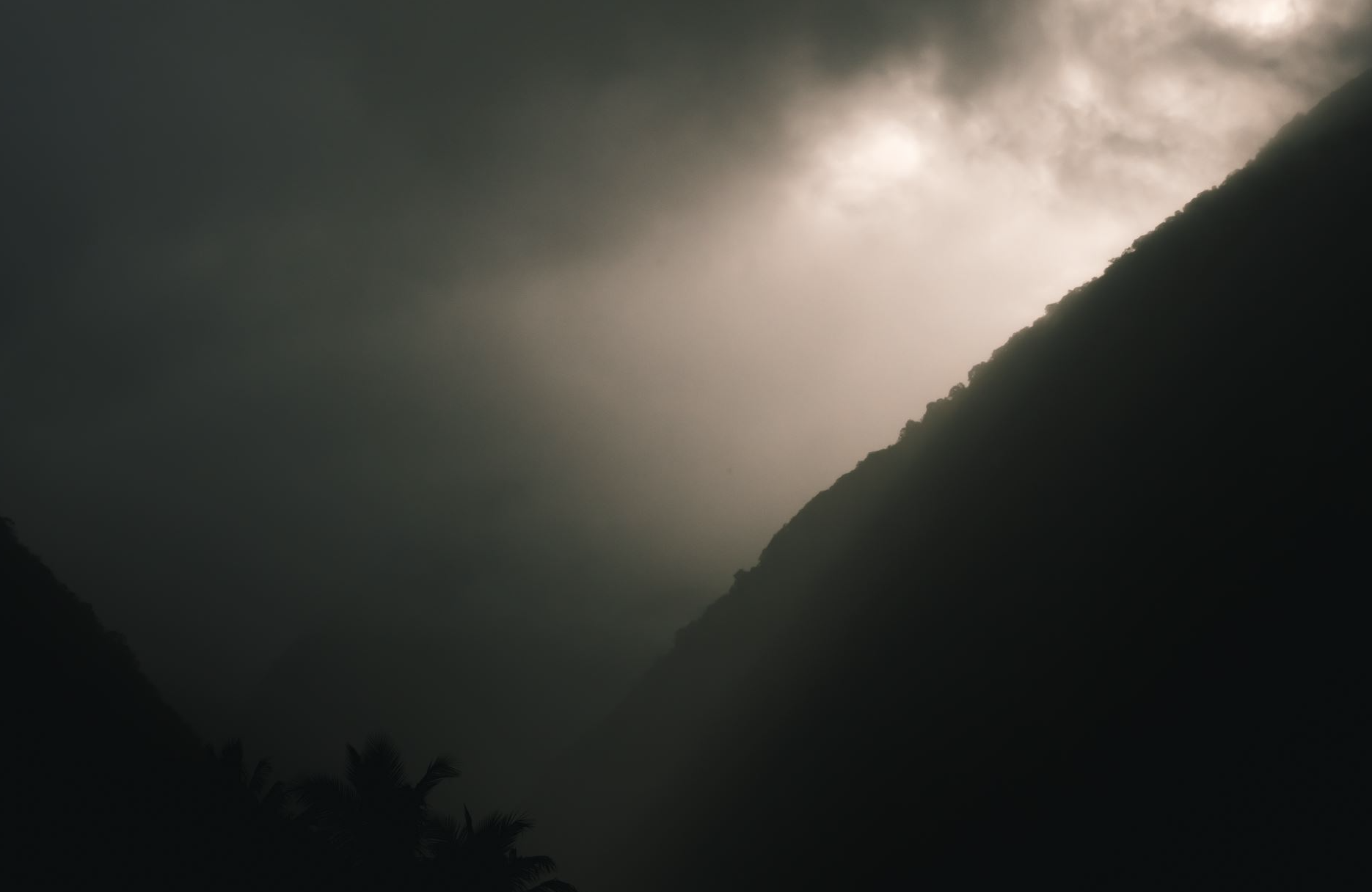The Touching Story of Haʻinakolo
The kāmakahala flower beauty in the mists of Waipiʻo
Part I: Hina & Kū Meet
Ka Pāpahi Lei Lehua
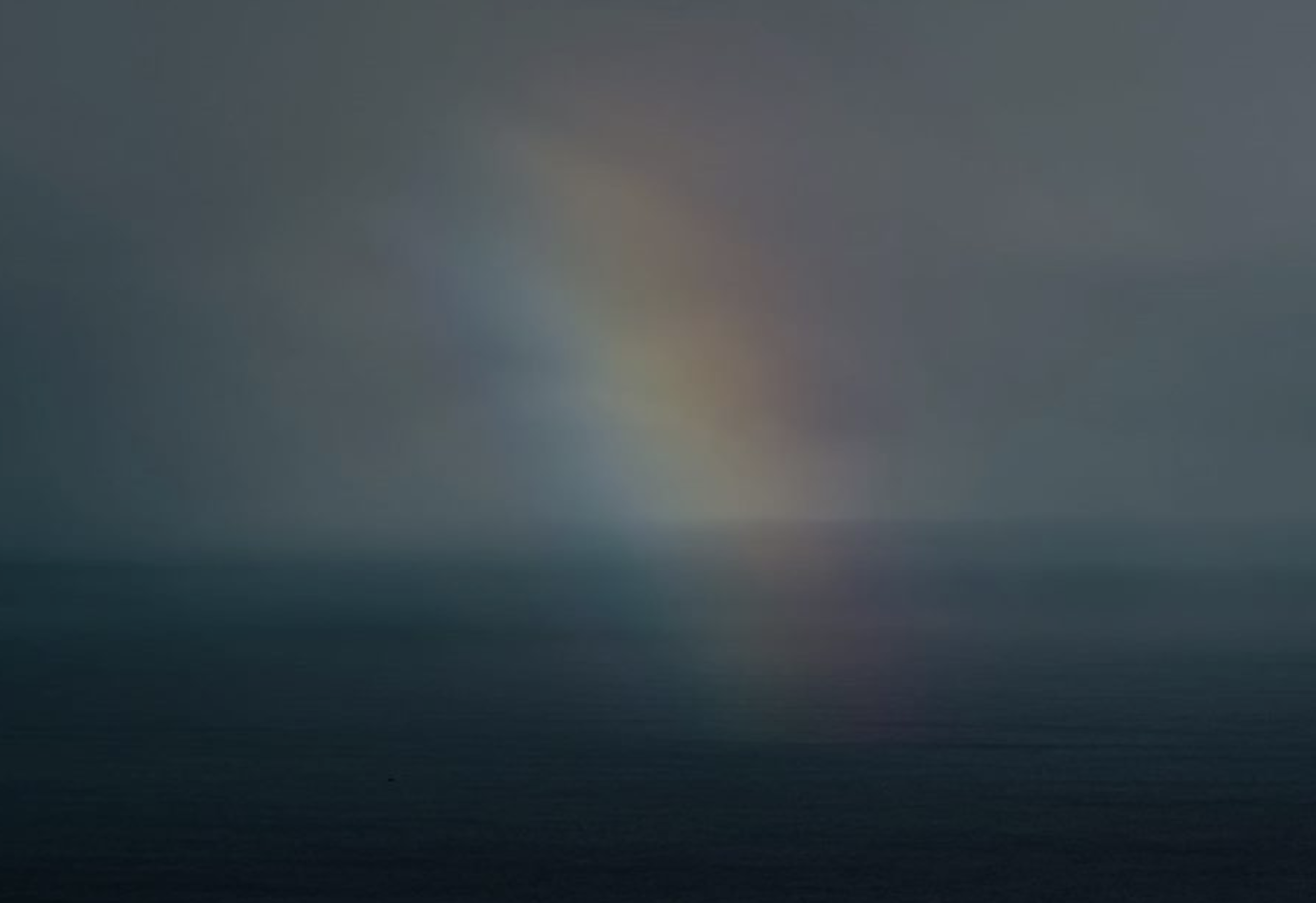
Greetings to all the readers desiring the story of the stunning beauty in the presence of Waipiʻo's cliffs. This is the first part of the touching story of Haʻinakolo, a famous traditional tale penned by Hoʻoulumāhiehie and published in the newspaper Ka Nai Aupuni (1 January 1907 - 1 May 1908).
It is only right that we begin at the opening of this story, so that we become familiar with Haʻinakolo's parents. Hinaʻaiulunui, her mother, is from the chiefly family of Waipiʻo valley, and her father, Kūʻaikauaakama, is from Kuaihelani. Hina and Kū fall in love at Hiʻilawe, and from there this harrowing journey goes all the way to the famous shores of Kuaihelani and back. Enjoy this small part of an epic tale penned by the literary giants of the past!

PART I
Maunakea and Beautiful Waipiʻo With Its Beveled Cliffs
In the days of remote antiquity here in Hawaiʻi—days now gone in the deep past—when the bays, ridges, valleys, small nooks, and beloved heights of Hawaiʻi were imbued with an extraordinary and marvelous consciousness of magical power, or perhaps the power of ancestral guardians, on the verdant island of Hawaiʻi, in the beautiful valley of Waipiʻo, in Hāmākua, the land famous for its steep trails on the deeply carved cliff faces, there lived an exceptionally beautiful woman, Hinaʻaiulunui.
She was the treasured and guarded child of her parents. No person laid eyes on her. No one even glimpsed her beauty, except for her own parents, her attendants, and her kahuna.
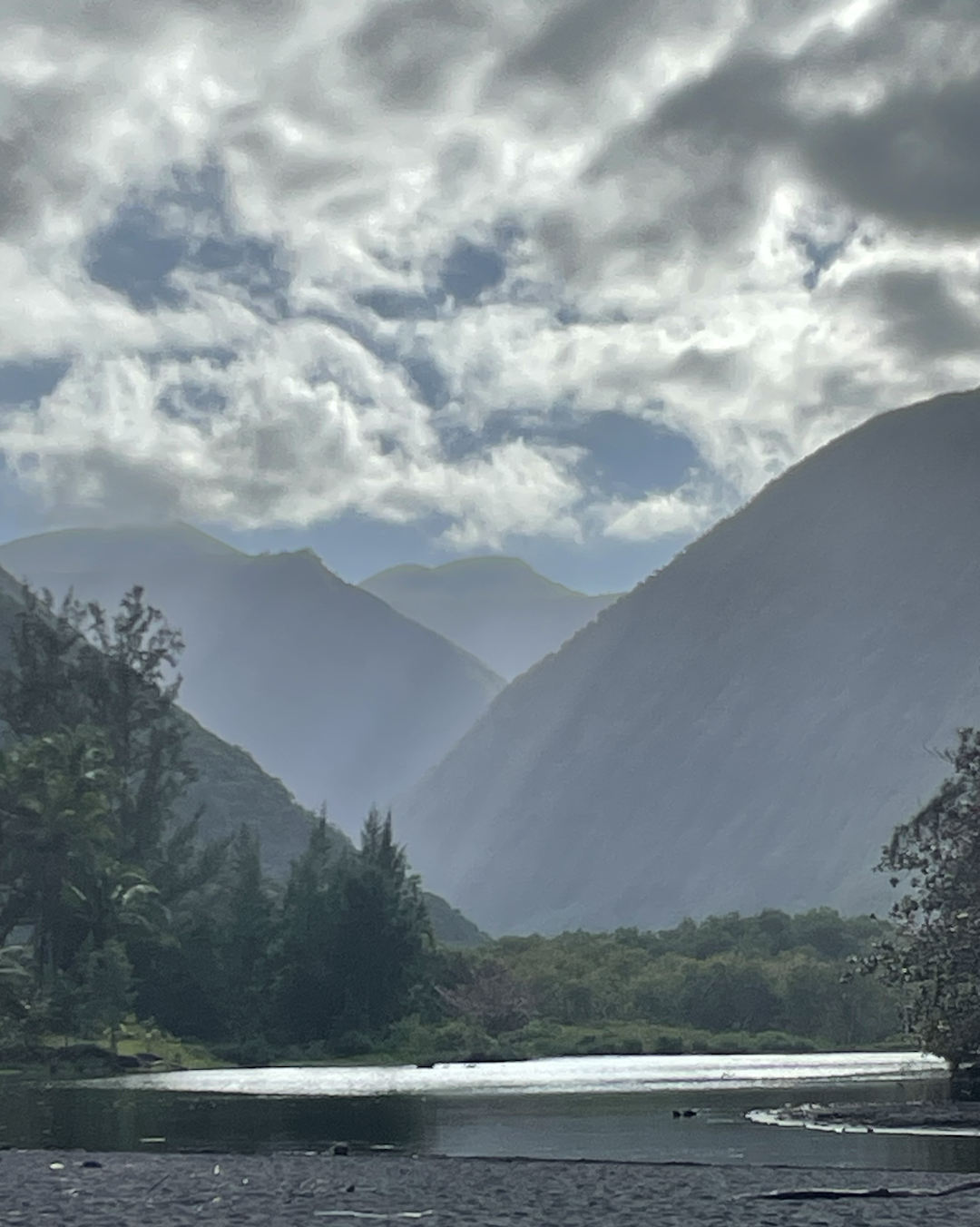
When Hina was grown and after the days when the strictures of her chiefly status were set, she was allowed to enter the opening to the Hiʻilawe waterfall’s plunge pool to bathe in the fresh water’s spray whenever she wanted. And every time she went to bathe in the waters of Hiʻilawe, her escorts attended her.
It was said the skin of the kamāliʻi wahine (young chiefess) shone beautifully, like the first morning rays of the sun. Every time this kamāliʻi wahine went to bathe at Hiʻilawe, rainbows arched halfway up the face of the cliff of this waterfall, which flowed with great force.
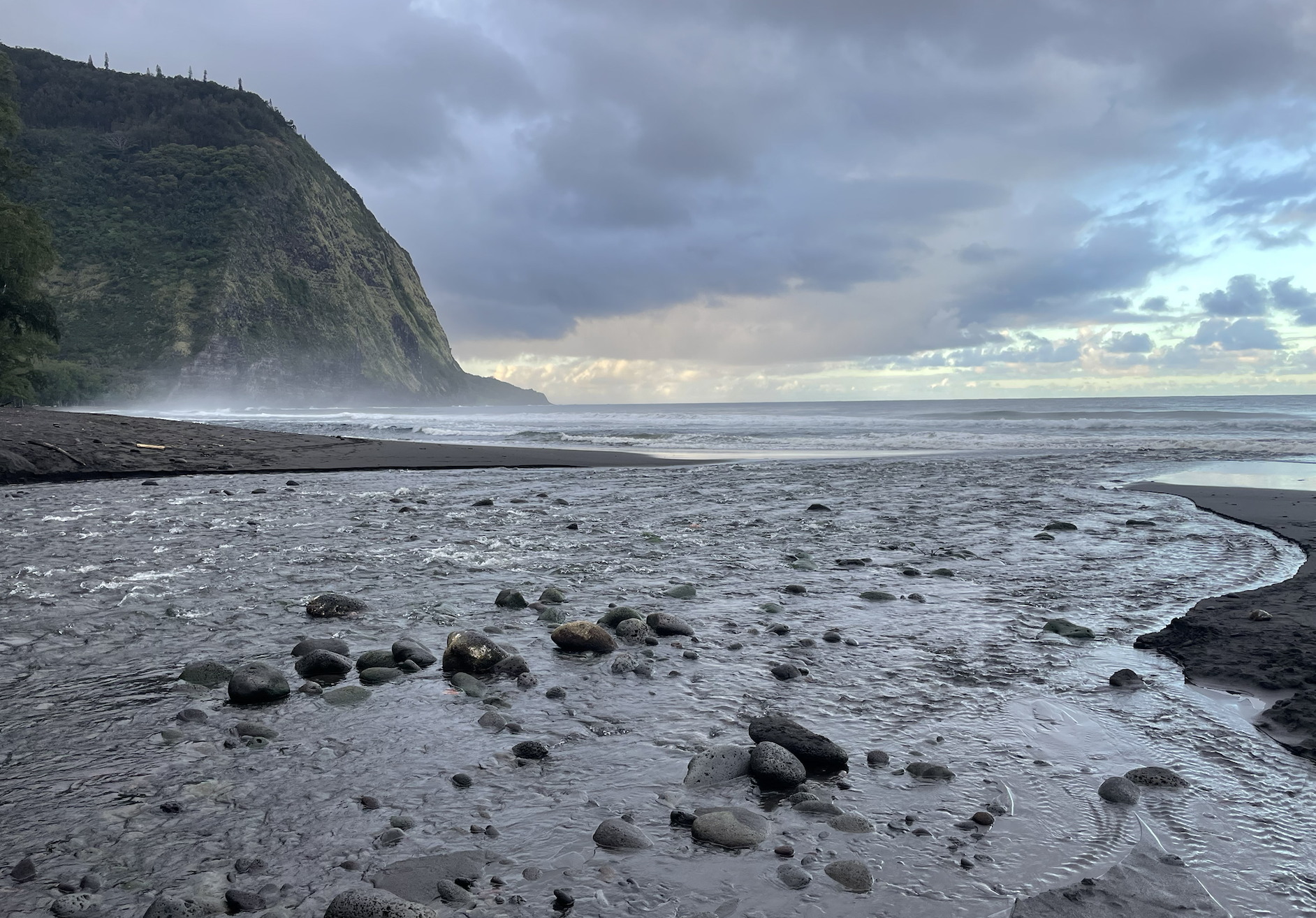
When Hina turned fifteen, the age when we, nowadays, look upon a cherished offspring and describe her as “Sweet fifteen,” the kamāliʻi wahine once again went to Hiʻilawe to bathe with her attendants, as was customary for her. When they arrived at the pool, Hina went ahead and stood at the edge, her eyes gazing upon the calm rippling of the water. As she looked, she was startled by what she perceived to be the undulating apparition of a person in the water.
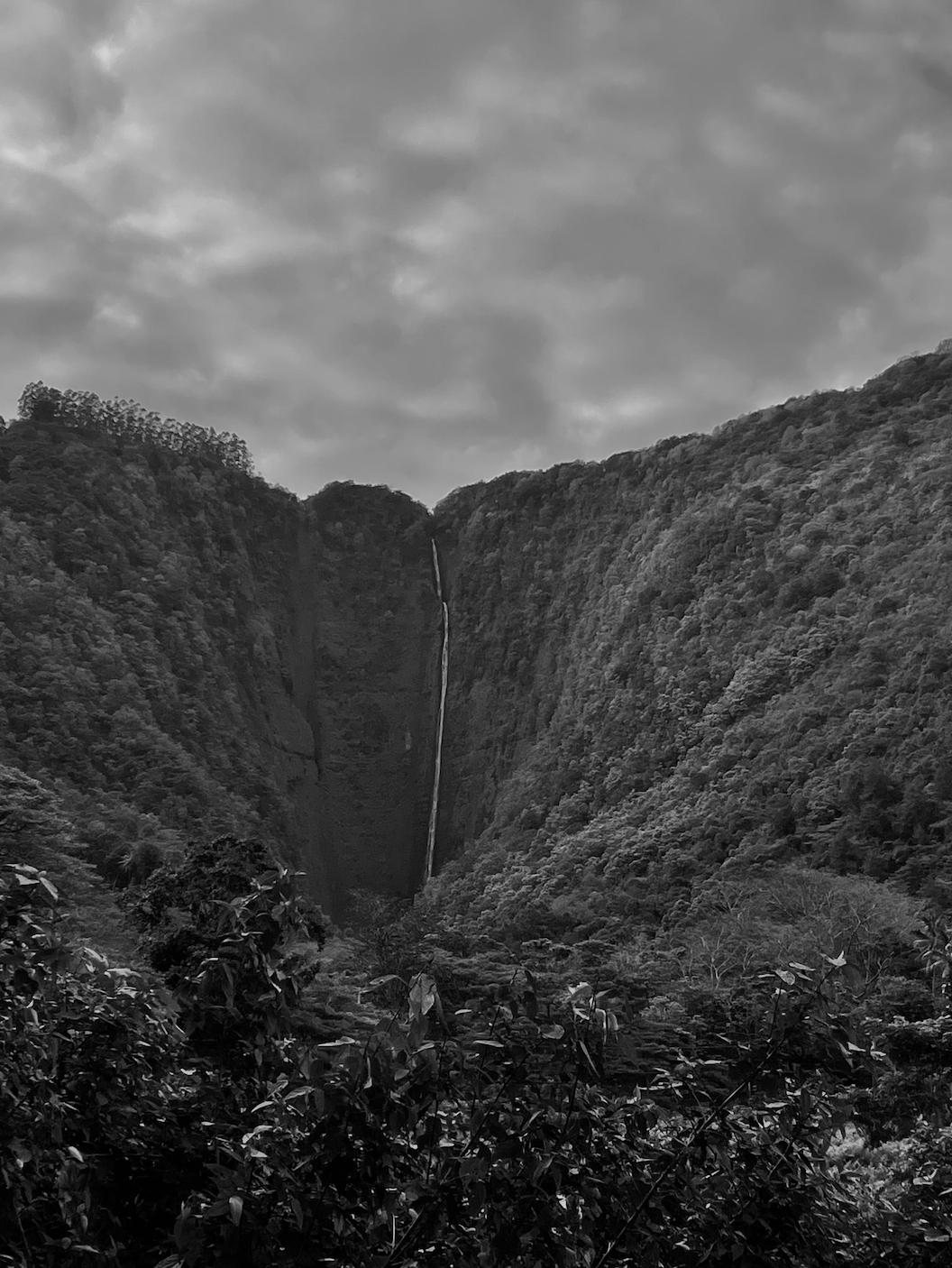
The apparition she saw was that of a young, exceedingly handsome, man. The head of the man’s shadow she observed was dazzling in her sight and adorned with lei lehua. As she continued to look at this strange vision in the water, she saw what looked like the simultaneous waving of a hand toward her, beckoning her to jump into the water. However, she stood there, absolutely dumbfounded, wondering to herself what was happening.
“What I’m seeing is truly amazing. I've always come here to bathe and I’ve never witnessed something as astonishing as this; at least never before today. Is this perhaps a real person I see, or a mysterious specter?”
Nevertheless, for as long as Hina continued to gaze at the apparition, the hand of the apparition continued waving. Yet, she did not call out to her attendants, sitting a little ways away from where she stood looking at this amazing vision.
With great trepidation filling her heart and under the strange influence of the handsome man, she removed her pāʻū of hīnano, and leapt into the water. When she went down into the water, she came up for air and turned her gaze to the ridgeline of the cliff facing Kohala. She saw a man standing on the precipice, staring down toward the pool.
Be patient, there is more to be revealed.



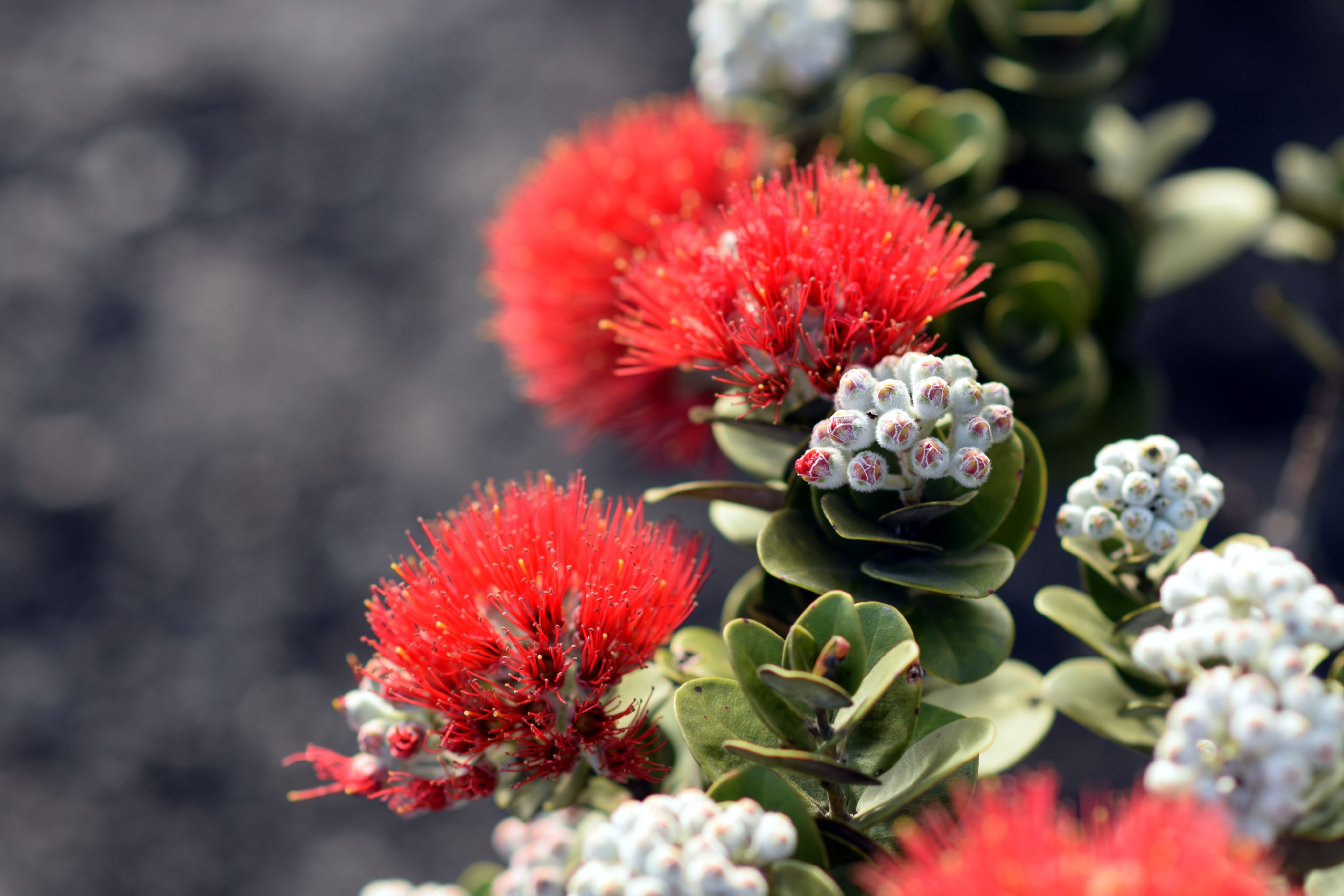
Hina saw the man’s head was adorned with lei lehua, and that he was fine-looking, like the vision she’d seen in the water. However, his appearance was even more striking now, as she beheld his actual features. He gazed at her in the water and she at him. She beckoned him to come down and to bathe together with her in the exhilarating waters of the pool of Hiʻilawe. And, as she was so excited at having waved toward the man, she dove down into the water.
When she dove and came back up, she was startled by something gently touching her head, and she asked herself with great bewilderment, “What in the world is on my head?”
At the same time, she quickly lifted her hands and felt the mysterious thing. As she did this, her fingers met with lehua petals, which fluttered down and floated upon the surface of the rippling water, and she realized that a lei lehua was resting on her head.
“This is so crazy!” she exclaimed to herself. “Is this really a lei lehua adorning me? Who, I wonder, garlanded me with this lei?”
Then, she turned and looked toward the man she had seen standing on the top of the cliff and saw him smiling down at her. She motioned to him. Her eyes widened as something else touched her head and a cluster of lehua flowers fell in front of her. She seized the bouquet and inhaled. As she continued to breathe in the scent of the lehua, the end of a wondrous rainbow, starting from the cliff face where she saw the handsome man, touched down and covered the pool where she was bathing. She then saw the spectacle of the wondrous stranger descending inside the rainbow.
Hina’s attendants gasped excitedly, saying, “What an amazing rainbow. It’s enveloping our ward’s sacred pool. Such a rainbow is certainly a wondrous sight to see!”
It was, in fact, a rainbow that Hina’s attendants were seeing, but they did not see the form of a man, as Hina did when the rainbow descended from the cliff.
The incredibly handsome man came down with the rainbow and stood at the edge of the pool, saying to Hina, “What a pleasure to meet you for the first time! Greetings to you!”
“Well! I didn’t think you’d actually come down to see me, since I was just waving at you for fun. What are we to do? Well, you’ve seen me, from head to toe, so I greet you with affection, stranger. Would you like to jump in the water to swim together? Wait! Say, was it you who tossed down this garland sitting on my head, as well as the bouquet of lehua I’m holding?”
“Yes. I was the one who gave you the pretty flowers, O stunning beauty of the cliffs. Now, concerning your invitation to swim together in your pool, I cannot agree to do so at this time. I have just met you. I will return to my home until the right time—which is soon to come—for us to meet again. But, let me add, I will come to see you at dawn. When you sleep tonight, you will hear the sound of the shearwater, but it will not be me. Though when you hear the sound of the hinihini kuamauna and the kāhuli snail as dawn approaches, know to yourself that it’s me.
“And, where do you live?” asked Hina of the wondrous stranger. The man replied, “My abode is up on the mountain, Maunakea. I came down from there and saw you from the top of the cliff.”
“And, what is your name?” Hina asked the young man.
“Certainly, you ask an appropriate question, O beauty of Hiʻilawe, and I’ll tell you my name. It is Kūʻaikauaakama, though you may shorten it to Kū. And, if I’m not mistaken, might your name be Hinaʻaiulunui?”
“My goodness!” exclaimed an extremely puzzled Hina. “How in the world do you know my name, as you are a stranger to me and I to you?”
"I have known your name for some time now. When a person is born, their name is too. And, where I come from, the name of a chief is never unknown to us. Heed my words, Hina! I will not bathe in this pool, as I have a different pool in which to bathe with you when the right time comes. So, I bid you farewell, as I now return to the cold of Maunakea. Remember the sound of the pololei kuamauna and the kāhuli, the singing snail.
When a person is born, their name is too.
At that moment, the base of the rainbow lifted abruptly and the young man of the astonishing lei lehua vanished. As for Hina, a burning desire quickly welled up within her for the young man. She left the pool in a hurry and speedily returned to the valley floor.
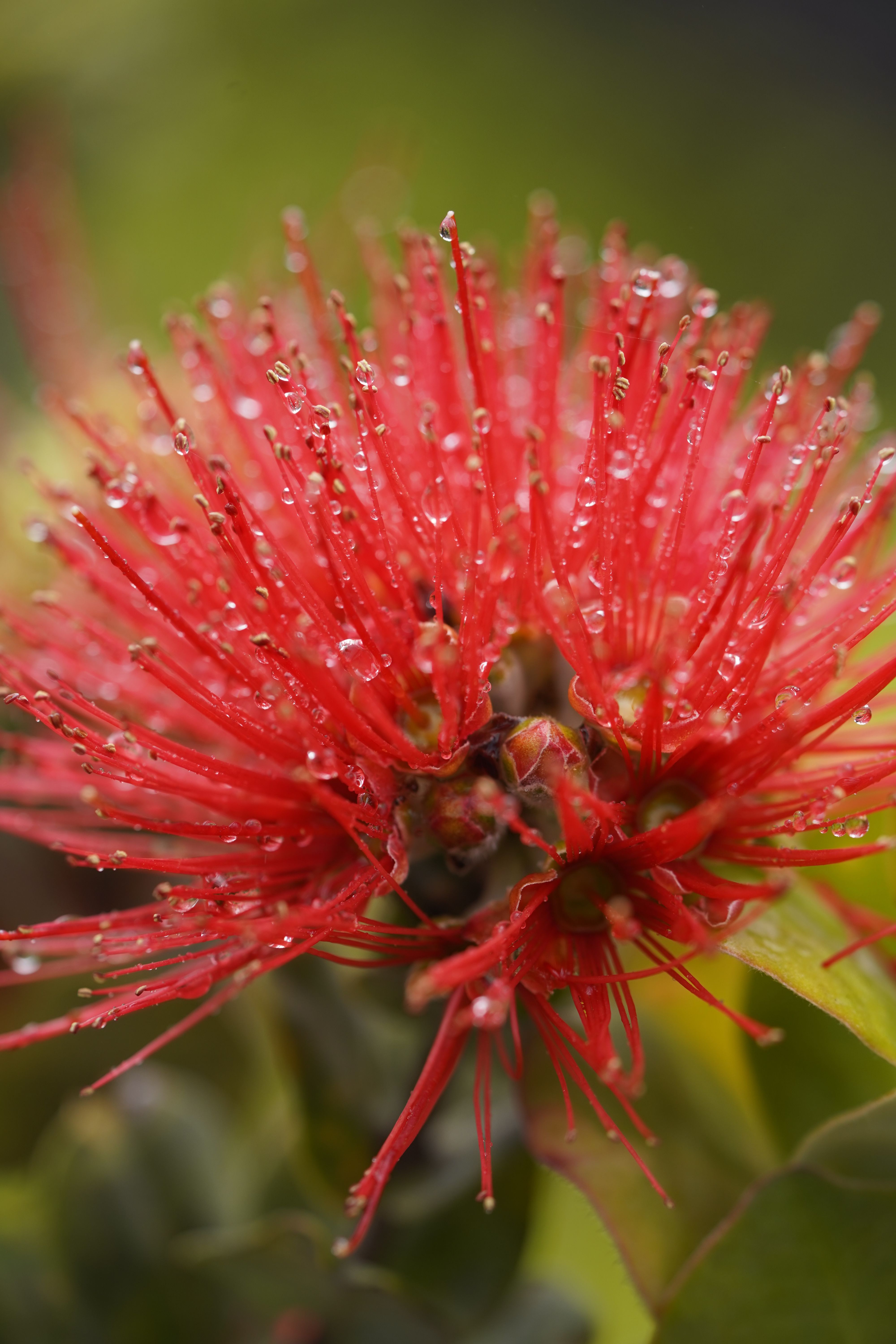
In the middle of the night, the attendants of the kamāliʻi wahine were fast asleep, but Hina was rolling around in her bed, tossing and turning from side to side. She spent hardly a moment lying on one side before flipping over to the other. Then, with almost no time in that position, she turned face up. She became distraught, her heart aching with desire.
That night, a calm and serenely beautiful one, peace settled over all of Waipiʻo, from the tops of the ridges out to the flatlands that were serenaded by the murmuring of cool waters coming from the uplands.
Meanwhile, Hina was asking herself, “When is he going to get here? And if he does show up, what's he going to do with me when he does? He said to me, when I urged him to bathe with me in the pool, that he wouldn’t, and that he had a different pool to bathe in with me when the time was right.
“And, he told me to remember the sound of the hinihini and the sound of the pūpū kanioe snail. Actually, I don’t see a problem if it were tonight that he arrived and wanted to make love. That would be okay. For me, there’s no issue. I'll soon be dizzy, though, without something to relieve this tension.”
As these amorous thoughts continued, she heard the sound of the petrel, the bird that calls near dawn. She turned, listening intently for the teasing sound of the pololei kani kuamauna snail. Suddenly, she realized that the time was near that the words of her beloved of the fine, leaping mists of Hiʻilawe were about to be fulfilled. Straight away, there came the soft sound of the pūpū kanioe,
Turn beneath, little snail
Turn above, little snail
Kāhuli with a lei of red
Adornment for the ʻākōlea
Sound of the kāhuli
Sound of the kāhuli
There, there, there you are
There, there, there you are
Turn, little snail, turn
Little snail, lei of red
Adornment for the ʻākōlea!
While Hina was listening to the sound of the kāhuli, the house was suffused with all the fragrant scents of the forest. And in response, she shared this,
Chant 4
Let my love’s story be told
A fragrance pervades,
It is the scent of maile,
Instilling itself in me,
Directing my being,
My being is humbled by love,
I see through the eyes of love.
As soon as these lines were uttered, these words of supplication, the interior of the house filled with light and she saw the man, Kūʻaikauaakama, in repose atop the wings of birds, an arching rainbow surrounding him. Then, she heard the voice of the man calling out her name,
Chant 5
A Name Prayer for Hina
O Hina!
O Hinaiuka! O Hinaikai!
O Hinaʻaiulunui,
O Hinapukuiʻa,
O Hinapūloaʻa,
O Hinamelelani,
My dear sister,
It is I, Kū—
Kūʻaikauaakama—
Your elder brother,
It was I who opened the path,
Making it easier for you, my sibling—
Are you sleeping?
When Kū’s invocation was complete, Hina offered this prayer to her chiefly elder brother,
Chant 6
A name prayer for Kūʻaikauaakama
It is you, Kūleiʻula,
You are Kū of the land
You are Kū of the sea
You are Kū at the sacred summit of Kuaihelani
Open the scarlet path of Kāne,
Generate the flow of lehua nectar
Respond and confirm your name,
Kūʻaikauaakama, my dear brother, my lord
Here am I, Hina,
Hinapāmakani of the cliffs of Waipiʻo
A heavenly bond, a sacred bond, dearest Kū.

When the invocation by the beauty of the cascading waterfall of Hiʻilawe was complete, Kūʻaikauaakama came down from the bird wings, upon which he was sitting. He went to where his sister was lying in fragrant kapa and said calmly, “I have arrived as I said to you I would yesterday. My journey and appearance at the break of dawn is my way of showing that our familial bond cannot be severed. I am the elder and you the younger. When I was born, I was taken by our grandfather, Kūwahailo. I was transported by him to Kuaihelani and was raised there until I left those lands and returned here to Hawaiʻi.
“Listen, dearest sister. Yes, you are my sister, as Nanailaniakama is our biological father, and ʻOakailunaikeaouli is our biological mother. I was born as Kū and you as Hina. Yet, it is also true that Kūwahailo is the reason for my existence, as his power is what caused my birth from the womb of our biological mother. And, because of that, I was given a particular name, as a child of Kūwahailo, a strong and powerful being of Kuaihelani.
“I am a Hawaiian mortal via birth by my mother, but I am a being of Kuaihelani via my creation and being raised there to adulthood. Kūwahailo is grandfather to both of us by one genealogical line. As they are godly restrictions, the limits placed on me are quite rigid. And only when those strictures have been ceremoniously removed will my body be free to be with you. However, that is not difficult to accomplish.
“Here is what I’m thinking, dear sister,
you and I should set ourselves upon the wings of the birds and continue our discussion in the sky. And, before the first light pierces the morning, I’ll return you to your sacred space as you are the beloved feather lei of our mother, ʻOakailunaikeaouli.”
In this manner, the brother enticed the sister to get on the wings of the birds. This was an appealing idea to Hina, as she had never before rested upon the velvety wings of birds.
As they sat on the birds, Kū called upon these same birds to take flight and deliver them to the summit of Maunakea. In the blink of Hina’s eye, they were within a house made of a rainbow, atop a mountain whose dome was covered in snow, a cold snow that pinches the skin.
“This place where we have just arrived,” said Kū to his sister, Hina, “is the summit of Maunakea, and this is where I dwell. I brought you here so that I could explain to you the story of my coming from Kuaihelani and arriving here.”
Then, the animated one from the summit of Maunakea began to reveal the entire story of his journey from Kuaihelani on a double hull canoe. He shared about landing first at Niʻihau and then moving on to Kauaʻi. He told his sister about climbing the mountain of Waiʻaleʻale with the hope of finding residence there, but when he searched, he realized there was no snow there, the clear white snow of the place he came from, the place that had, indeed, become a second home for him. He then left “fair Kauaʻi, perfect in the calm,” continued his journey and landed ashore on Oʻahu.
Like his unproductive search for a place to live at the summit of Waiʻaleʻale, so too did he ascend to the mountaintop Kaʻala, called the “rooftop”. But, it too lacked a place for him to settle. Thus, he went to Maui, to the top of the mountain Haleakalā, and finally saw snow like that of his second home. However, he was not enticed by the beauty of that mountain.
Then, he shared with his sister, Hina, how he saw from atop Haleakalā, the gleaming of the snow on Maunakea, the mountain where they sat together murmuring. And Maunakea, to his eyes, was like a “white chicken” strutting proudly on a calm day.
“When I saw the snow here on Maunakea” said the the beautiful native of the mountain, as he continued speaking to his sister, “I also observed a rainbow touching down directly on a community along the eastern portion of Hāmākua, and I was excited because that was a sign of a sacred personage from the realm of the gods.
“Yet, when I saw it, it knew it wasn’t the sign of a male, rather a female whose standing red rainbow sign I could see. So, I left Haleakalā and descended to the shore, got aboard my double hull canoe, and sailed here to verdant Hawaiʻi.
“I arrived here and saw this beautiful peak and decided to myself that this would be where I'd live. From here, I saw a standing rainbow at the same place I saw it from Haleakalā, and from this height I came down and saw you bathing alone in the sacred pool.
“And when I saw you, your outstanding, youthful beauty was unlike any other my eyes had ever seen before, as are your name and your connection to me by birth. Our ancestors in obscurity, and in Kuaihelani, revealed that you were my younger female sibling and also revealed the names of our parents.
“Therefore, as you can see, my beloved younger sister, I am your brother. And when I take you for my woman, we will be royally matched together. What do you think about that? I take you, my sister, as a woman for myself, and you take me, your brother, as a man for yourself.
“Here is what I propose. Hold off on your desire for me. I will first return you, and you will stay where I brought you from. Within ten days hence, I will leave Maunakea and go to get you at Waipiʻo.
“What I have revealed to you, our joining together, is not something you should share with our parents, nor anyone else. Refrain from letting our parents know about me until the day we are betrothed, and so too with any people of this land.
“I will take you back to stay until I return. Then, I’ll await the arrival of your kahuna, Aniani. As I understand, when the sun appears and is seen on the horizon, he will go up from Waipiʻo to Waimea and from there, come all the way up here to the summit of Maunakea. The reason for his journey is to betroth us together.


When Kūʻaikauaakama finished speaking to his sister, she sat silent for some time. Then she answered, with tears welling up, moistening her lashes.
“You are being unbelievably cruel, brother. I had mistakenly thought you’d bring me here to the summit of the mountain and we'd make love. Yet, I'm going back without having experienced lovemaking. How sad for the one from Hiʻilawe waterfall, to not have laid with you.
“Everything you have shared with me, dear brother,” Hina continued on, “has been wonderful, from one perspective. And yet, from another perspective, it has ruthlessly dashed my deepest desires. Had I felt the tingling pleasure of you, the yearning that kept me awake would have been fulfilled when you came to get me. Well, then, take me back wanting, depressed, and distraught. I tell you, woe be our first born.
I can already see what will transpire; what I had hoped for and desired, which welled up within me as I was made to wander alone through the wilderness, all the while hoping that I would reach the pinnacle of love, I now realize will not come to pass. And so shall be the fate of our beloved first-born, made to go astray, a tearful vagabond; since here too is her mother, only fleetingly knowing the passion of true love. I tell you this: our first-born will be a female.
When Hina finished speaking, her eyes were red, as if a fire were blazing in them, and at that point, she presented the lines of this chant, as a prophecy for the eldest who would be born from her when she joined with Kūʻaikauaakama,
Chant 7
A Prayer in Protest—A Prophecy
I am beloved, as the Hiʻilawe waterfall
The leaping water on the face of the cliff
Where the wind blows intensely
The birds of Kaʻauana fly, scattered
I plunge into the deep ocean
Kuaihelani is my destination
It’s shifting sands unrestrained
The voice of the hinihini is muffled
The sound is deceiving
Leading me down an incorrect path
Wandering bereft in the forest
Following the path, crying
Bearing this love on my back
My love, my dearest
You are my desire
To experience the joy of love here
And yet, rejection
I have nothing
I have been without for so long
I am unlucky
I fall away from his gaze
Woe is Waipiʻo—
When Hina was done with this chant of supplication, she spoke to her betrothed brother, to Kū, with tears falling on her cheeks: “If only we'd made love, for now I'm left without. I will wait for the day of our consummation.”
These words from Hina were meant to really cause her brother suffering and, indeed, make him love her. And, for that reason, the author composed these few lines of song:
Oh where are you, mist,
Rain that moves across the plain,
My companion of the red rainbow,
When together on the mats of Kaluanui,
So generous with love upon arrival,
Yet I am upset to learn your thoughts,
And ready to weep,
At what you think love is,
Love in the waters of Kahoʻi,
You return there, yet what of me?
Kū replied to his sister, “You are too much, my dear sister! I thought you would be patient and wait for the right time, as I explained to you, then we would be with one another. But here you are, bemoaning the fate of our unborn child. Listen carefully, that prayer you just uttered will only damn our eldest daughter.
"And, like the complaint you just shared along with your desire, so too will be the result: our eldest shall be called Hāʻinakolo of the cliffs of Waipiʻo, in the mistsy waters of Hiʻilawe. However, don’t be hasty with further temptation, sister, since my godly restrictions have not been removed yet.
"Be patient until that obstacle is cleared, then then come get what it is you want, and I won't refuse, for it is a shared desire that has already been expressed between us. I will return you; it is dawn.”
With that, the spirited one of Maunakea turned and called to the birds to fly down to Waipiʻo. Then, as if Hina’s eyes had been opened, she looked about and saw that she was in her chiefly home laying on her fragrant bedding of kapa. As for her beloved, the one she had been together with on the wings of birds, he was nowhere to be seen. And it felt, in that moment, like it had all been a dream.
ʻAʻole i pau.
*Should you find errors or have comments for the translators, we would greatly appreciate emails at kauamelemele@gmail.com
Mahalo!
